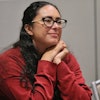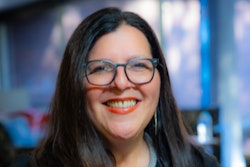The Road From Bowie to Indianapolis: Sharing the IT Experience
For information technology professionals, administrators and faculty members at American colleges and universities, technology conferences provide useful forums for teaching and learning about the latest trends in computing and other technologies.
Among those professionals in positions to share knowledge about their school’s technology experiences, there’s tremendous interest in showcasing the latest and greatest innovations in information technology. More often than not, those innovative practices are based at the wealthiest and most technologically advanced institutions.
In an effort to demonstrate how less affluent schools can pursue a cost-effective strategy for migrating academic courses to the Internet, two IT professionals and a faculty member, originally based at historically Black Bowie State University in Bowie, Md., have taken their experiences with Web page authoring software to promote Web-based and Web enhanced courses among IT professionals at higher education conferences.
Nola Stair, an instructional design technologist at the University of Maryland-Baltimore campus; Charleita Jones, director of academic computing at Bowie State University; and Dr. A. Deloris James, a writing instructor at the University of Maryland-College Park, began making “e-learning” presentations in 1999 when all three were based at Bowie State.
Late this month, the trio takes center stage with “Bridging the Digital Divide: Challenges and Potentials” at the annual Educause conference in Indianapolis. The topic reflects a growing interest by Educause, the nation’s leading association of higher education IT professionals, in issues relating to the digital divide and the technology gap between wealthy and less wealthy colleges and universities.
“There’s great interest to get more diversity at all levels of the organization and the annual conference,” says David Staudt, project director of Educause’s Advanced Networking-Minority Serving Institution initiative.
Staudt says presenters at the Educause conference, which draws about 6,000 attendees to the annual event, have to undergo a competitive selection process because the event receives more proposals for presentations than it can accommodate.
Part of the basis of the Bowie presentation is to show faculty members and IT staffs how using the Microsoft FrontPage Web page software represents a cost effective alternative to Web-based course management platforms, such as Blackboard and WebCT. Despite a marketplace largely captured by the makers of enterprise software platforms like Blackboard and WebCT, the option to train faculty members on Microsoft FrontPage so they can develop either Web-based courses or Web enhanced courses remains a viable course for many schools, according to Stair.
“It means a little more work and more commitment by faculty members, but (FrontPage) is an inexpensive development tool that allowed us to focus on reconceptualizing the delivery of instruction,” Stair says.
The origins of the presentation hail back to 1998 when Stair, who was then director of academic computing at Bowie State, was selected along with three faculty members by then provost Dr. Esther Ward to participate in a University of Maryland system IT initiative, known as Web Initiative in Teaching or WIT. The initiative involved teams from Maryland’s 13 public colleges and universities developing Web-based courses as a way of jumpstarting online distance education efforts at the individual campuses.
Stair recalls that she and her team members opted to use an off-the-shelf software product rather than committing Bowie State to products offered by the software companies specializing in the higher education market.
“We didn’t have funds at the time to buy a new server or expensive software,” Stair says.
Taking a home-grown approach, which contrasted with the approach of the other Maryland schools, the Bowie State team thrived and the team’s three faculty members all developed award-winning Web-based and Web-enhanced versions of their classes in due time.
“I was excited about technology. I teach (business) professional writing classes, and I wanted to prepare my students for entering into today’s workplace,” says James.
Stair says the group wanted to share information about its success with other historically Black institutions, and team members began presenting its results at a HBCU technology exposition in Atlanta in 1999. A Bowie State team returned to Atlanta in 2000 not too long after the academic computing department sponsored a summer institute for nearly 30 faculty members at Bowie State.
Even as the team considered applying to present at Educause, team members faced the possibility of being hired away from Bowie State because their visibility in the WIT program had made them well known among their Maryland colleagues. By the time their presentation proposal won acceptance by Educause earlier this year, Stair and James had taken jobs at other Maryland campuses. While Stair continues to work with Bowie State faculty members, Jones now serves as acting director of Bowie State’s academic computing department. The trio made an e-learning presentation earlier this summer at a National Urban League conference.
“I knew I wanted to present at Educause because it’s the premier IT conference. That’s why (we) submitted a proposal,” Stair says.
© Copyright 2005 by DiverseEducation.com















